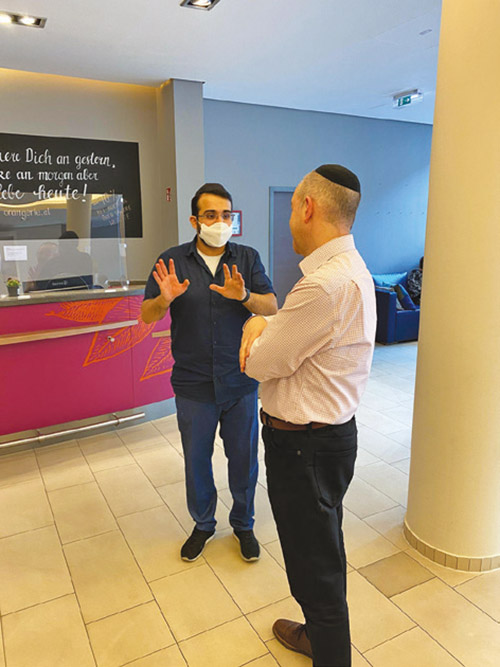

We recently spent 54 hours in Vienna.
At the invitation of a close friend, Maxim Slutsky, whom Rabbi Binyamin Krauss worked with when living in Frankfurt, we were invited to see how the city and the Jewish community has transformed itself and been transformed since the outset of the war; February 24 is a date everyone knows—for many of them, it was the last day of normalcy.
We landed Friday morning, and were immediately brought to Wollzeile 17, a relatively new home for Russian-speaking Jews in Vienna, and the command center over the past few weeks for refugee support. From there, buses have been organized to pick people up from the borders of Hungary or Poland.
To date, 700 Jewish refugees are among the close to 60,000 Ukrainian refugees who made their way to Austria. Four hotels have been completely dedicated to housing these families. Stocked with food, the hotels are clean and provide daily meals, bringing dignity and respect to those that need it most. Approximately 150 kids were enrolled immediately in one of the two Jewish schools in Vienna. More than 80 apartments have already been secured, and these refugees will begin moving into more permanent housing soon, with other newcomers likely to take their hotel rooms next. For Shabbat, the pre-March group of 50 guests ballooned into more than 150 individuals. The community is now preparing Pesach Sedarim to accommodate triple that number, and looking for a new space to house the community which has grown by 20% overnight.
We met a woman from Chernigov, a city in the north of Ukraine, with her two-month-old baby. Most of her town was destroyed and she assumes that she will stay in Vienna for the long term. We met a teaching team from Dnipro, a city that has been spared most of the bombing so far, but most people fled because they did not know what tomorrow will bring. We saw cars in the street with Ukrainian license plates and learned that they can park for free until the end of April. Even the expensive cars were, for many, most of what they currently have access to, with limited access to their own bank accounts and property and businesses that are either actually destroyed or practically not functioning. Some families came without their husbands and fathers, because all men 18-60 are not allowed to leave. Those with three children under 18 are granted exceptions.
We witnessed incredible strength of character, positivity and perseverance on all sides. Those who have been displaced manage to smile and express gratitude for what they have. And those who stopped everything to support see it as their calling as Jews, as neighbors, and as citizens of the world. They are learning by doing, and making decisions that need to be made now and figuring out how to cover the costs later.
When we were introduced to the leadership of the Jewish community, and when we spoke to those we met about the purpose of our trip, we explained:
We know that something big is going on, and the needs are overwhelming;
We think that the concept of arvut implores us to do our part to alleviate the potential suffering; and
We hope that we can find meaningful ways for our community to connect with this community, and we believe that these connections can be meaningful in both directions.
I have no doubt that what we saw in Vienna is in many ways similar to what you might find in Budapest, Berlin, Warsaw, Kishinev and elsewhere. So many factors impact where people end up and how and whether they are supported. We also believe that the international support network including UJA, JDC, United Hatzalah and others is critical and has a bigger view of how people in crisis can be helped. At the same time, we became convinced that a tangible partnership and relationship can bring tangible relief, and joy, to real people,and will likely inspire others to follow suit.
We would like to develop this partnership over the coming weeks and months with the goals of:
Supporting the community and these new refugees;
Learning from them and their experiences; and
Bringing members of the SAR community to witness this work and strengthen these relationships.
We are planning to identify a small group of SAR High School seniors to spend 10 days in Vienna to support the effort, and bring physical and spiritual sustenance to the newcomers. We believe that this small but actionable gesture will make a difference, will send a message of positive activism to our students, and is in line with our mission of engaging the world, especially at a time of need. We are eager to get to work.
By Rabbi Binyamin Krauss (principal, SAR Academy) and Rabbi Tully Harcsztark (principal, SAR High School; dean, Machon Siach)













